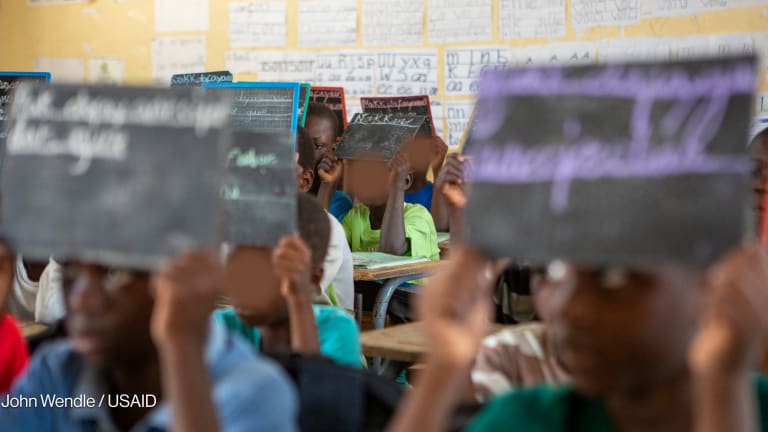
A growing community of practitioners and academics is forming under the banner of Doing Development Differently, or DDD. Drafted after an event in Cambridge last October, the movement’s manifesto emphasizes principles and strategies — old and new — that aim to generate the impact that current initiatives struggle to achieve. For example, DDD highlights the importance of locally defined problems and locally owned solutions, rapid iteration between design and implementation in development projects and working across multiple sectors and actors to foster lasting results.
The movement to do development differently faces challenges in shaping programs and policies with these characteristics in a sector that suffers from the rigidity and inefficiencies of “one-size-fits-all” approaches. These challenges were discussed at a Manila workshop in April. But there is another driver of change that has yet to enter the discussion: Doing development differently also entails teaching development differently.
One of the longest but surest ways to promote sustainable transformation in the sector is to change the way development is taught to new professionals. And for those seeking to transform development paradigms through the emancipatory power of knowledge and wisdom, it is particularly important to make its pedagogy consistent with its goals.
With these challenges in mind, here are a few principles for doing development education differently.
1. Development work is multidisciplinary and multidimensional.
Development is about more than economic growth. It is a complex process with multiple dimensions: economic as well as political, cultural, technological, bureaucratic, military, agricultural and more. A shift along one of those dimensions creates shifts along others, from the local to the global levels.
The major implication from this is that development work is multidisciplinary. You cannot tackle several dimensions with a single discipline. This no longer a minority viewpoint in the sector, evidenced most clearly in the fact that an anthropologist/physician leads the World Bank.
Working in a multidisciplinary way does not mean eliminating specialties or requiring that everyone be a polymath. However, it does require enough understanding of other fields to know how to collaborate with them. Students enter the sector from schools of business, law, public health, economics, public administration and more; increasing diversity in their perspectives means increasing opportunities for cross-registration of courses and cross-pollination of ideas. Graduate programs that are inherently multidisciplinary could benefit from expanding beyond merely multiple academic disciplines by ensuring that non-academic perspectives from practitioners, journalists and others are also present.
2. Exposure is a fundamental part of learning and — just as importantly — unlearning.
From students to seasoned professionals, regardless of where they are in the world, ultimately everyone acts on imperfect information and limited individual knowledge. A middle-class Swede entering graduate school has limited understanding of what poverty looks like in Afghanistan, or in the United States for that matter. A ministry official and a nongovernmental organization staff member have different perspectives on development challenges within a single country. Even leaders of grassroots movements often do not experience with the same intensity the condition of poverty of their poorest peers.
Exposure is the bridge that connects different perspectives to our own. Actively hearing these voices in person and experiencing challenging contexts firsthand remind us how much we do not know. Exposure reminds us to be humble, renews our empathy and commitment, and gives us the opportunity for self-reflection. This is particularly important for development professionals because they hold significant power to influence the lives of people living in poverty.
Exposure can take many forms in development education. Overseas placements, internships and consulting-based projects are common, but need an integrated reflective component to ensure that they result in meaningful changes in perspective.
Schools with multiple campuses could make it easier for students to spend semesters abroad, an increasingly common practice for undergraduate students but challenging for mid-career professionals. Equally important is having diverse student bodies and faculties; lectures and classroom discussions become richer and more meaningful with multiple perspectives interjected.
3. Understanding identity, privilege and personal biases matter.
One critical lesson of exposure is that we each bring a particular perspective to our work, and this can be tinged by our own privileged status. In a world of unequal power relations and opportunities, some ways of seeing the world have more influence than others. The dominance of some worldviews works counter to the DDD principles, as it blurs the contextual differences across a very diverse ecosystem of nations, cultures, and people.
Development education exacerbates this if it teaches students to look at “other” people, communities, and countries, without an appreciation of their own biases. When students launch new projects in developing countries or work in “capacity building” roles, even though they lack the experience to do similar work at home, they rely on privileged resources and connections. While some students have indeed exceptional skills and experience, it can be very easy to use privilege without offering genuine value.
There is no simple way to instill the reflexivity needed to be aware of one’s own privilege. The new generation of development practitioners should strive to know when to soften their own voices, to facilitate the dialogue among those directly involved in a particular initiative, and to let people speak for themselves. Establishing an approach to development education with a stronger emphasis on critical thinking, interpersonal skills, and fieldwork will help.
Unfortunately, this problem starts at the level of development scholars; for example, academic conferences and journals on African economic development are disconnected from the continent itself. Development practitioners, students, and scholars need to question this kind of lack of diversity and the power relations it perpetuates.
4. Adaptive development takes adaptive management.
Working adaptively and iteratively is central to DDD. Numerous cases from the Manila and Cambridge workshops demonstrate how development work must be tailored to context, iterative to seek the best fit, and adaptive in response to changing circumstances. Typical contracting and management methods are not well suited for this. Many projects struggle under the burden of overly rigid structures, epitomized by the dreaded log-frame.
One potential solution lies in a better balance of structure and autonomy to create the space for adaptive work. Structure can channel deliberate decisions about shifts in strategy or “small bets” that test new approaches, while autonomy gives the decision making authority to those best placed to exercise it. Whether through technology tools or more conventional methods like political networks, monitoring and landscape sensing can inform those decisions.
Teaching management is always tough, so incorporating adaptive management into development education will not be easy. Sharing frameworks or tools is not enough. Management is best learned while doing, tackling real decisions with mentorship and support. The next-best approach is through case studies: narrative accounts of actual challenges facing managers, interrogated in classroom discussions, form a core part of pedagogy at many leading business schools. This approach could work well for the development sector, leveraging case study materials generated by Innovations for Successful Societies at Princeton or the World Bank’s Global Delivery Initiative.
5. Development work demands individual self-care and personal resilience.
Development attracts highly committed professionals. Most them expect that the work will be challenging, but unfortunately, the sector still has a professional culture of downplaying stresses and shocks.
Little training or support exists to help students to deal with the personal challenges of development in practice.
Everyone manages their personal experience in the field differently, but certain issues cut across work in all sectors: the mundane stresses of travel and separation from loved ones; the cognitive load of working in unfamiliar cultural contexts; the inevitable questioning of purpose when grappling with global injustices; and the shocks brought by events that impact personal safety and health. Development work is not a permanent personal sacrifice, and thinking that it should be is dangerous. This thinking stops us from seeing the early signs of stress. It can lead talented professionals to burn out and to leave projects before they generate meaningful impact. In more severe cases, it can lead to self-destructive behavior or lasting trauma.
This is critical to the DDD agenda because better development relies on human relationships and long-term understanding of a given context. The professionals best equipped to achieve this will be those with the emotional, physical, and relational intelligence to endure the personal challenges of development, without sacrificing their own happiness and health.
Development education can help to prepare students to face these challenges, as the classroom can be a powerful environment to discuss self-care and fieldwork resilience. Educational settings are one step removed from the work itself, allowing critical space for reflection. They can also promote intergenerational learning by inviting seasoned practitioners to share their experience with students.
Summary: Connecting content and pedagogy
Doing development education differently requires more than merely changing the topics covered or updating the readings on a syllabus. The content and the pedagogy go hand-in-hand. When education is implemented as a dialectic process and established as a relationship of collaboration, the learning that starts in the classroom goes beyond the transfer of technical or analytical skills. This type of education is internalized by students in the form of principles that guide their future practice, rather than a mere collection of methods and analytical tools — too often adopted without exposure to the context they intend to change.
Collaboration between student and teacher mirrors that between development professional and development stakeholders. Education that sets a different kind of experience will be reflected in professionals better able to design flexible projects, more sensitive to local circumstances and resilient in overcoming practical challenges as they pursue a meaningful impact.
Whether you’re a seasoned expert or budding development professional — check out more news, analysis and advice online to guide your career and professional development, and subscribe to Doing Good to receive top international development career and recruitment news every week.









